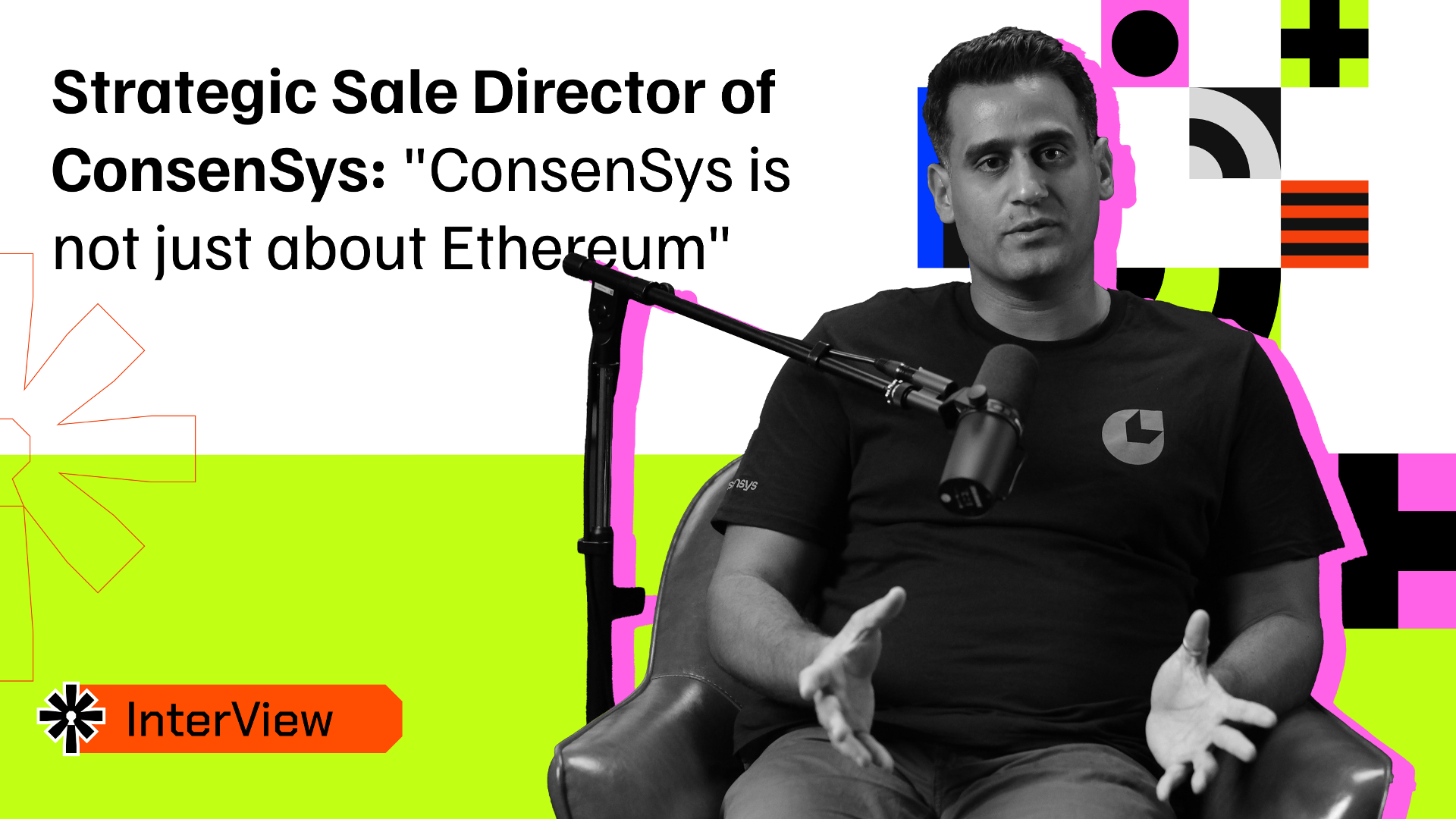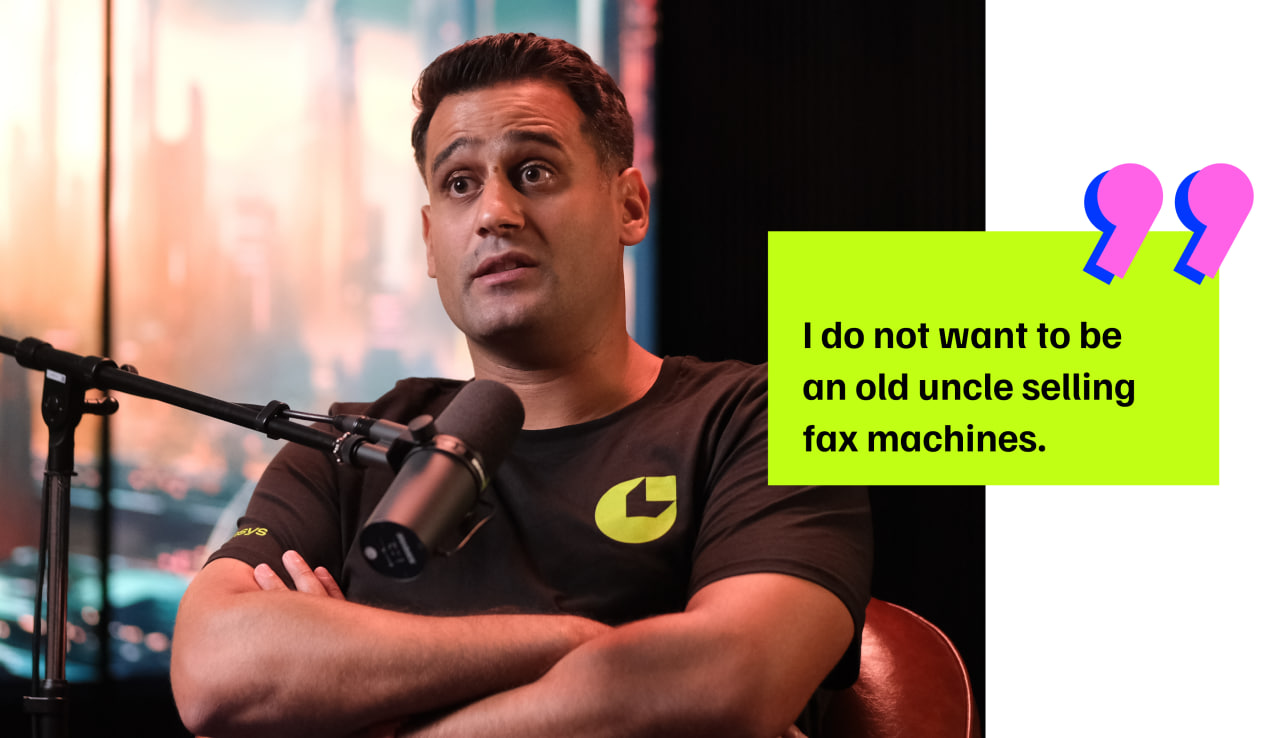
Strategic Sale Director of ConsenSys: "ConsenSys is not just about Ethereum"
"I don't know" - Marouen often repeats this phrase when asked about certain Web3 issues, even during interviews or when presenting at events. He always maintains a humble attitude, ready to learn more about new things in the market. He often introduces himself as a "Web3 Intern" even though others see him as an "expert" in the industry.
Born and raised in a country on the Mediterranean coast of North Africa, he currently holds the position of Strategic Sale Director at ConsenSys, known as the "giant" leading the blockchain field. Before this, he worked at OutSystems, the world's most comprehensive low-code solution platform. Later, he recognized the potential of blockchain technology and became a "real builder”.

You obtained your master's degree in computer science from a French university. Afterward, you spent time in cloud computing companies developing applications and systems. What motivated you to join the crypto industry?
- At first, when working at cloud computing companies, I thought that was the trend. Next was digital transformation, which helped turn paper-based work into computer applications. I have exchanged ideas with many companies and helped them build applications for human resources and commerce, thereby changing their operating models.
It was interesting until I started thinking about my life after 30. If everything goes well, how many years have I left to work? 20 or 30 years. From that moment on, I realized that if I continued like that, I would become someone like the uncle who sells fax machines now. Because he did not upgrade and develop himself. I started reading reports from Gartner about emerging technologies. At that time, I paid attention to blockchain and AI. Both have the motivation to develop and could peak in the next 10 to 15 years.

Based on my career survival experience, this is the time to step forward and explore something new. I could spend 10 years in the blockchain market and maybe do something new. I think that keeping fresh is very important for everyone.
Do you think crypto will give us life-changing opportunity?
- It depends on how you approach this market. If you are a builder, this will be a great environment. Every few weeks, there will be something new, and you can directly contribute to the development of the industry because the scale of Web3 still needs to be more significant. It is interesting to see many people changing their lives from being developers to becoming builders.
For Users, the majority of people join the market for profit. Although access and trading are more accessible, it does not help you succeed in this market if you are not a professional trader.
Now let's remove the financial element. I think crypto is an exciting trend for users. In recent years, we have seen NFTs being collected in games like Axie Infinity. Web3 communities are built on NFTs. People can create their identities with them. I am Azuki, or I am Penguin. It's a cultural trend. Therefore, I think crypto doesn't necessarily create "life-changing opportunities" but can be seen as an exciting trend in which most users can participate.
What is your outlook on the future trends in the crypto industry? Which sector do you think will attract money when a bull run comes?
- A bull run will not happen without a reason. I'm not an economist, but there needs to be some motivation. Some features will emerge, and a bull run will occur.

There are many things worth paying attention to, like the Asian market, gaming, and social networks. You can not trade tokens 24/7 but can spend the whole day playing games. This is an exciting use case. I can spend the entire day looking at my NFTs."

Vitalik Buterin has just introduced the new standard ERC-4337, paving the way for the development of account abstraction. Does ConsenSys plan to integrate this Account Abstraction feature into its product?
- Not yet, but it will happen soon. We plan to implement Account Abstraction on Linea when the mainnet launches and you can create smart contract wallets on it. Metamask is still researching and developing these features, which may be implemented through Snap or other ways to allow users to create these accounts.
For layer 2 solutions like Linea, it's a chicken-and-egg story. You build a scaling solution like Layer 2 to attract more users, transactions, and volume. To achieve that, you need to minimize complexity for users. We can not expect everyone to remember 12-word passphrases. Instead, the model should give us an experience like creating a bank account, where you can easily recover your data and use it.
-VJneJoFoOApgj4XN.png)
However, there is still a lot of work to be done. In many recent events, we have partnered with other wallet developers to educate users and builders about Account Abstraction and its features.
At the same time, we are still developing the pieces to ensure this feature can work. Some infrastructure pieces still need to be completed, such as gas management. We are still integrating them. Also, we need to consider the user experience when creating a new account. All of this can not be built in-house. We need to collaborate and discuss with other developers.
Hopefully, in the next few months, we will see these features come together and allow builders and users to use this type of wallet.
MPC Wallet is a solution many parties use to improve the user experience. What is your opinion between MPC Wallet and the account abstraction feature?
- Different use cases are designed for different demands. For example, with MPC Wallet, we have a product called MetaMask Institutional for corporations and investment firms that want to connect with Web3 applications but want to manage them in their way.
Many partners want to integrate MPC features, such as Fireblock. However, if you ask me if I need MPC Wallet as an individual user, the answer is no. Each technology has pros and cons, and I will not blindly use them.

For a long time, ConsenSys has been known as an OG in the Ethereum ecosystem. Products like Infura provide infrastructure, while Metamask is a wallet application with millions of users on EVM blockchains. Not stopping there, ConsenSys is stepping outside the Ethereum house to expand its product offerings and target the entire Web3 market.
ConsenSys has always been committed to scaling Ethereum. MetaMask only supports EVM chains, while Linea aims to increase scalability for Ethereum. Does ConsenSys plan to provide services to more customers (blockchains)?
- ConsenSys is aiming for Web3 and decentralization. Most of us believe that Ethereum aligns with these ideals, but we can not predict the future. Only a fool does not change their thinking. However, you can not do everything.
Therefore, we focus on a few things and optimize them. For example, Infura provides RPC services for many different blockchains. Some are compatible with Ethereum (EVM), while others are not.
Many builders operate on non-EVM blockchains. They need infrastructure and tools to build and develop. Building a non-EVM blockchain requires a lot of resources and resources. Infura provides a solution for others to help if they cannot do everything themselves.
-gHzmEX4WIoUc93Oi.png)
Similarly, with Metamask, Metamask Snap allows developers to build on top of the wallet application. If someone wants to use Metamask to connect to Solana, they can build on it.
We aim to build an open platform where everyone can participate and help us build the community and applications on top. Because we can not do everything.
Before Linea was deployed, Polygon Labs and Matter Labs launched zkEVM chains. What do you think about the competition between these networks?
- You can not build a good product without competition.
In the past, there was a period when many Layer 1 networks emerged to be alternatives to Ethereum. It was a good testing phase, and we learned a lot. Ethereum faced scaling limitations, leading to solutions like Arbitrum and Optimism rollups.
However, the Web3 market is still too large, and each project can find a place if its product is good enough. Besides, there is still a lot of work to be done. We have deployed the Linea mainnet, but not everything is ready. Many improvements will be applied. Therefore, everyone is trying to improve it, and we will learn a lot from each other.

Besides, I have noticed many changes in social media recently. Today I just installed the Threads app. It is like Facebook and a competitor to Twitter. Elon Musk has changed Twitter, and some people want to decentralize it. Therefore, social media will be an area we need to pay attention to.
On another aspect, each blockchain is the infrastructure for an ecosystem, like a city. Each city will have many builders and unique features. Polygon has its applications and users, and Linea is the same. The best scenario is that users can freely "travel" between different cities and use the infrastructure without thinking about it. Yeah, it's not necessarily about competition but a developmental journey where everyone can improve technology together.
